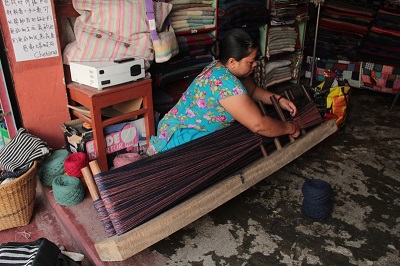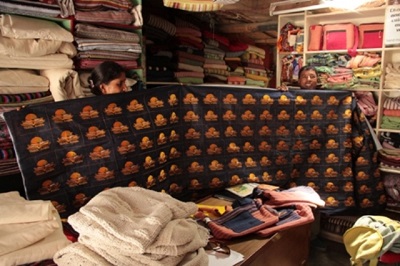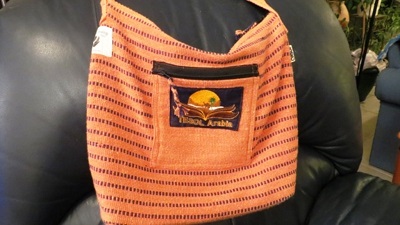|
Chetana Women's Empowerment Group offers a maximum 2-year
training/work program, helping women become self-sufficient providers
for their families. So far, Chetana has trained more than 80 women.
After the training, the women take the skills that they have gained to
acquire employment in local shops or to return to their village homes
and continue producing and selling back to Chetana their finished loomed
fabrics (See their Facebook
page).
The process begins with the initial dying of cotton thread in a
multitude of colors, and then it is left to air dry for several days.
The next step is the winding of the thread so as to make a variety of
patterns in the finished fabric. These threads are then woven on
low-to-the-ground handlooms where the women sit for hours on floor
cushions as they create the wonderful patterns that you see. After that,
the newly created fabrics are cut for various designs and then sewn
together to make the final products.

Chetana
Women’s Skill Development Project (PDF) is a not-for-profit,
nongovernmental organization registered in Nepal. Established in 2008,
it creates opportunities for women of Nepal. Because it promotes the
traditional handicrafts of Nepal, it also contributes to sustainability.
Women in Nepal have a 27% illiteracy rate, and one in four females is
involved in child labor. More than 160,000 Nepalese women are held in
Indian brothels, some from as young as 11 years old. Over 25% of
Nepalese women are married between the ages of 15 and 19. From 70–80%
are anemic, and the average life expectancy for women is 53 years old.
Nepalese women are deprived of education and discriminated against in
the job market (Chetana Women’s Skill Development Project,
2012–2013).
TESOL Arabia usually spends about US$20,000 per year to
purchase conference bags for the annual TESOL Arabia International
Conference and Exhibition, attended by 1,800 delegates and held in
March. The conference bags are usually nylon computer bags with the
TESOL Arabia logo embroidered on the front, sourced locally in Dubai,
but imported from China. This year, we decided to do something
different. Vicky Allen, a TESOL Arabia member from the Higher Colleges
of Technology, Fujairah, approached the conference co-chairs with a
novel idea: Purchase the conference bags from the Chetana Women’s Skill
Development Project and aid the community to support their families.
Vicky has been instrumental in setting up an extensive reading library
for the children of the community with a grant from the Extensive
Reading Foundation using the M-Reader website to track the
students’ reading. We were keen to take on this initiative, as TESOL
Arabia is looking for ways to give back to the greater community in the
spirit of sharing and building a better world.
Tara Timilshina is a dynamic, hardworking manager, teacher, and
role model for these women. Because of our existing friendship, Tara
immediately accepted the challenge of not only creating a conference bag
for TESOL Arabia 2015 but also figuring out a way to produce 2,000 of
them in 5 months. She was extremely excited about the opportunity and
told Vicky that “this is what we work for, to create new products that
people will enjoy!”
Not only did Tara and her husband take the 12-hour, round-trip
journey to Kathmandu to order the cotton, but she also found someone who
could re-create the TESOL Arabia embroidered logo on each of the bags.

While Vicky was there, she started designing the fabrics that
we would use for the bags and experimenting with different designs. As
you can see from the photos, the bags are unique in every way. During
this 5- to 6-month process, 22 women of Nepal will have been employed
and have received salary to support their families and provide for their
children.

Vicky says,
I want to thank Melanie Gobert and Rehab Rajab, conference
co-chairs, for being “out-of-the-box” thinkers. Because of their vision
to offer a conference bag that would support women in a developing
country, many children and families have been helped in Nepal by this
sustained employment for almost half a year.
If you are interested in sourcing your next conference’s bags
from the Chetana Women's Empowerment Group, please contact Vicky Allen
at vallen.hct.ac.ae.
Reference
Chetana Women’s Skill Development Project. (2012–2013). Chetana
Women’s Skill Development Project Catalogue. Retrieved from http://www.thehubnepal.com/AAA%20FINAL%20CATALOGUE.pdf
NOTE: Permission was received from Vicky Allen as a coauthor of this article. Parts of this article were originally published in Perspectives, the TESOL Arabia peer-reviewed journal, in November 2015, Volume 21, Issue 3, and on the TESOL Arabia Conference website.
Melanie Gobert
was a 2009 recipient of an Emirates Foundation Grant for a research
project, “Enhancing National Identity Through Indigenous Literature.”
She is currently TESOL Arabia president and conference co-chair. She was
the editor of Perspectives, the TESOL Arabia
peer-reviewed journal, from 2009–2014.
Vicky Allen has a
BA in linguistics, an MEd in deaf education, and a TESOL certification
from Anaheim University. Through most of her years of teaching, her
focus has been on extensive reading, incremental learning, and
individualized instruction. She has been instrumental in initiating a
special program at Fujairah Women’s College, which emphasizes extensive
reading, listening, speaking, and writing. |

